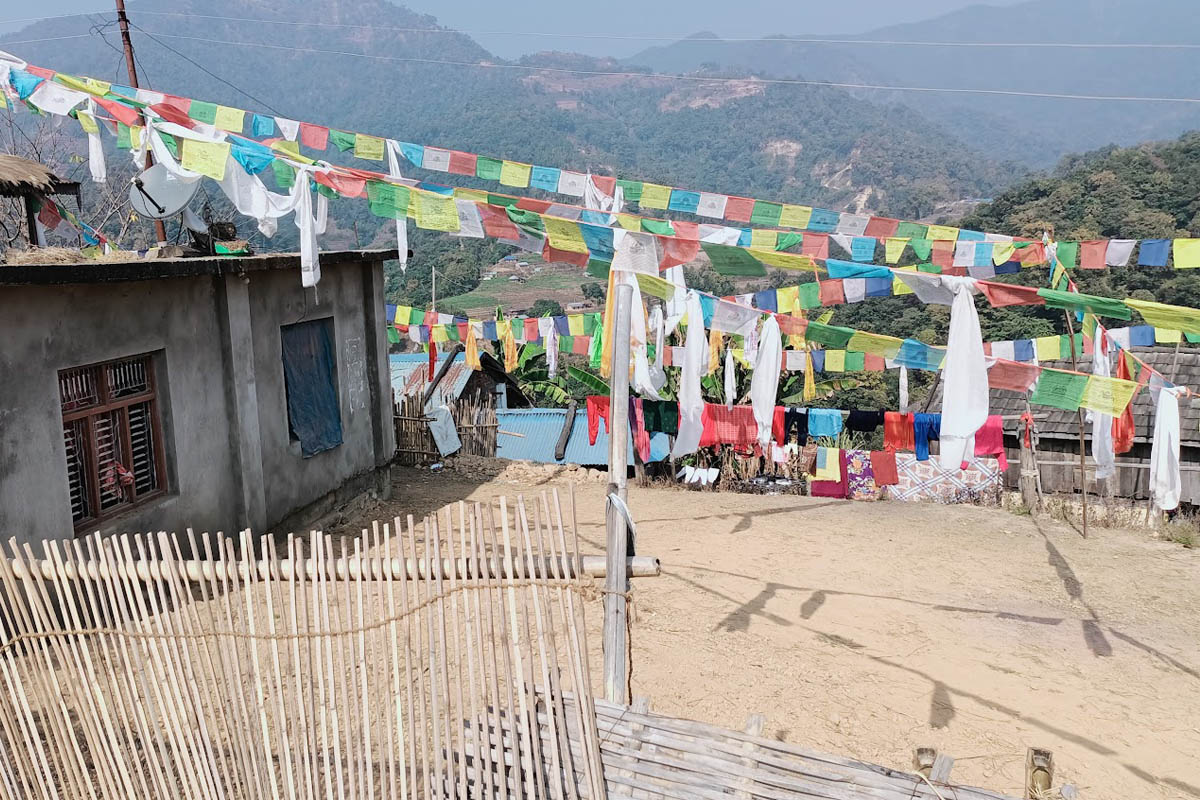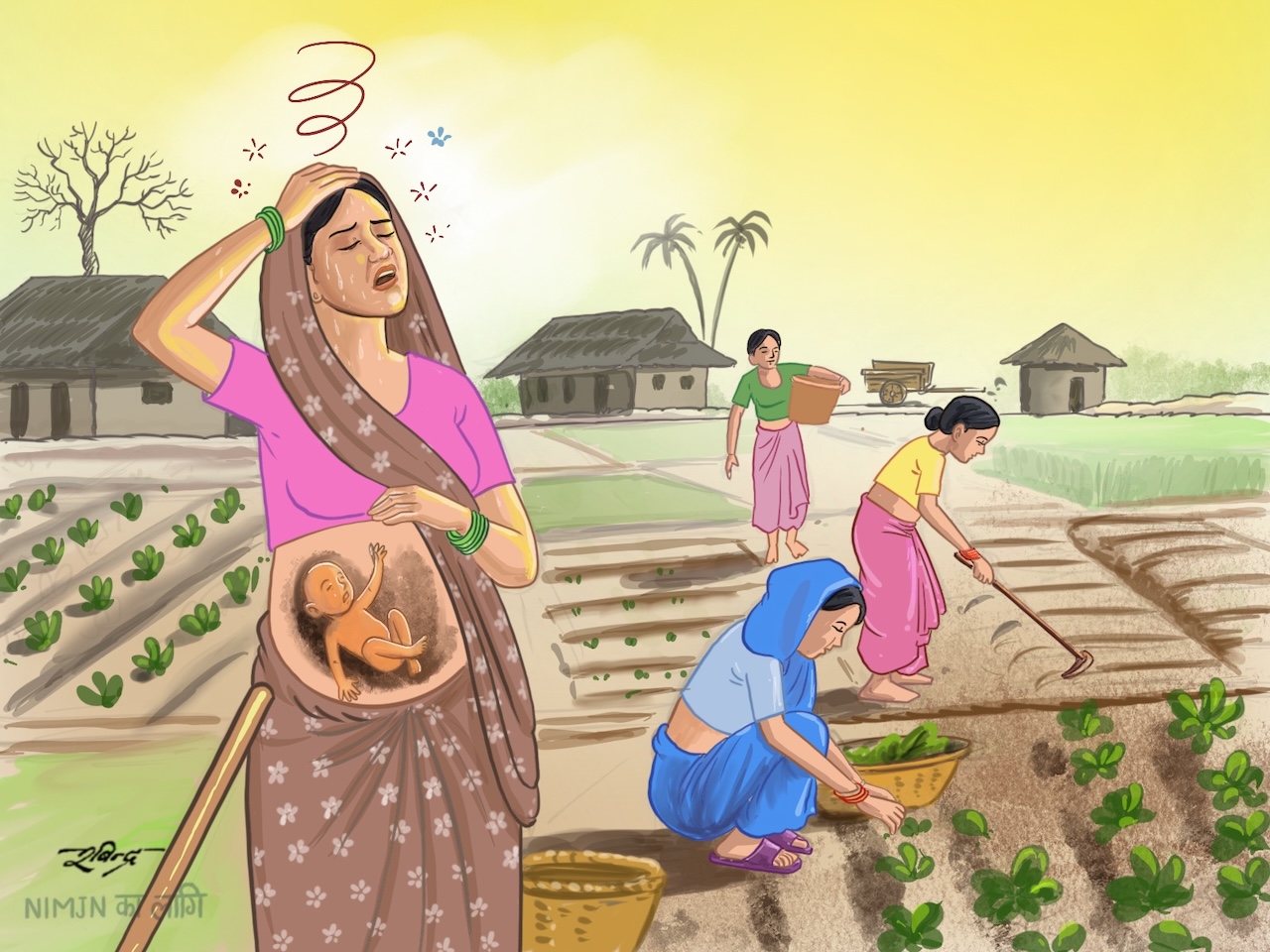Read this story in Nepali: लागूऔषध खोज्दै सीमापारि पुगेका युवा नै बन्छन् कारोबारी
Pokhara: Anish (name changed), from Dharan, was not fortunate enough to receive warmth and affection from his parents during his childhood. Growing up as a street child, he fell into the company of drug users and, under peer influence, began to consume drugs himself. Attracted by the prospect of money, he began to smuggle and sell narcotic drugs.
He was arrested in May.
 Suman (name changed), who hails from the western part of Gorkha, about 400 kilometers from Dharan, shares a similar story to that of Anish. At 12, he was addicted to smoking cigarettes, before becoming a drug user and then a drug trafficker. Suman has no recollection of how he fell into the abyss of addiction. According to him, he started smoking out of peer influence and then fell into addiction without realizing that he had fallen into this abysmal trap.
Suman (name changed), who hails from the western part of Gorkha, about 400 kilometers from Dharan, shares a similar story to that of Anish. At 12, he was addicted to smoking cigarettes, before becoming a drug user and then a drug trafficker. Suman has no recollection of how he fell into the abyss of addiction. According to him, he started smoking out of peer influence and then fell into addiction without realizing that he had fallen into this abysmal trap.
Suman and Anish are but just a few examples of youths who started doing drugs while still young and subsequently ruined their lives. According to a 2020 survey conducted by the Ministry of Home Affairs, there are a total of 130,424 substance abusers in Nepal. The survey shows that the number of drug users rose by 5.06 percent (Increased from which year to which year?), which means there are a total of 167,000 drug users in the country. The survey also reveals that youths aged 15-29 account for 76.7 percent of drug users, which clearly shows that a larger number of drug users are youths.
It has been revealed that those who do drugs when still adolescents have become drug smugglers when they grew older. Drug users go as far as across the border to India seeking drugs and bring them back to Nepal to sell them. Nepal Police say that the open border and availability of new types of drugs have posed a challenge to controlling the sale of narcotic drugs. The Gandaki Province Office of Nepal Police shows that most cases related to drug abuse are related to youths aged 16-25.
Available data from the last five years indicate that a total of 256 cases of substance abuse involving youth aged 16-15 were registered in 11 districts of Gandaki province in 2019/20. This number increased to 304 in 2020/21, 286 in 2021/22, and 231 in 2021/23. In 2023, up until February, 105 cases were reported, all involving the same age group of youth.
Crossing the border for drugs
Suman admits to crossing the border into India to purchase drugs. "I used to go across the border. There's a medical shop that sells drugs. We ask, 'Where can we get the drugs?' Then we taste a pinch to check the quality and decide whether to buy or not," Suman explained. He began bringing drugs from across the border to sell in Pokhara. "At first, we brought something called nex or something like that. It’s small in size, and we brought 35 sets. I earned around 6 to 7 thousand rupees," he recalled.
The narcotic drugs he bought for Rs 5,000 could be sold in Pokhara for as much as Rs 15,000. But the law eventually caught up with him, and he was arrested in Bhairahawa. "I was caught at the Sunauli border. They confiscated 65 sets of drugs at Buspark. I spent 90 days in custody there, after which I was brought here and held for another 90 days," he said. "Then I was sent to jail, where I don’t remember how long I stayed. I also saw some brothers [drug users] there," Suman added.
Anish, lured into drug trafficking by the promise of monetary gain, had nearly become a professional smuggler, according to the police investigation, said Bharat Thapa, coordinator of Voice of Children. Anish revealed during his testimony to the police that he used to travel to Jogbani, an Indian town bordering Biratnagar, to smuggle drugs, as it would double his profit.
Prem (name changed), from Parbat district, who has been to rehabilitation centers 17 times, was such a notorious addict that no rehab center was willing to accept him. “The situation had worsened to the point where no rehab in Pokhara would give me shelter, even if I offered to pay,” he said. “All the rehabs had given up on me. So, I went to Chitwan in search of one.”
Now 35, Prem fell into drug addiction at the age of 15 or 16. It started with cigarettes, then cannabis, and eventually brown sugar, before he began using stronger opioid drugs. “Then I started using TT (injections). The addiction escalated too much, too fast,” said Prem.
His addiction and cravings eventually led him into drug smuggling as well. “I used to buy from boys here. I didn’t have to go all the way to the border – it was available in Hetauda itself,” he said. “Once we knew where to get it, all the friends would go there. Police didn’t raid those places as often as they do now.”
Sunil Shrestha, an Inspector at the Narcotics Control Bureau of Nepal Police, says that law enforcement has been intensifying inspections and monitoring efforts to control drug trafficking, smuggling, and trade, but open borders and the influx of new varieties of narcotics present a challenge. “We have open borders, which makes drug trafficking and smuggling easier,” he said, adding that the easy availability of drugs used in medical treatment, such as Despram, brufen, morphine, and Phenergan, also facilitates drug consumption.
Abetted by digital banking
Digital banking has become a boon for drug traffickers, as they no longer need to carry cash to buy and sell drugs. Statistics from the Ward Police Office in Baidam, Kaski district, reveal that two major drug trafficking deals in fiscal year 2080/81 were conducted through mobile banking. In one case, police arrested two individuals in Pokhara after they had paid Rs 220,300 via a mobile banking app and were about to receive the remaining amount after the drugs were delivered. In the second case, three individuals were arrested after paying Rs 160,000 through a mobile banking app. Four others involved in this case remain at large.
Quitting studies for addiction
Most youths who use drugs are found to have quit studies, putting their future in darkness, and thus spending prime time of their life into drug addiction. Prem, whose father was in Nepal Police, was a student at a boarding school in Tanahun. He ran away from the hostel one day and never returned to school. After quitting school, he fell into the company of smokers and later started to do drugs. “I was a brilliant student until I was in grade three. I would be first in every exam but by the time I came to grade 4 and 5, I was doing worse in studies,” he recalled.
Others’ journey to addiction begins by tasting drugs for fun or replicating those who do drugs, in the family or outside, after which they quit studies altogether. Sujan from Pokhara recalls how he started. “My brother used to do drugs. He used to send me to purchase it from the shops and I also began to consume it,” he said. Soon he quit studies (he was in grade XI). Sujan regrets it now and he has made up his mind to quit drugs and concentrate on studies. He feels really bad that he has become a subject of reproach in the neighborhood.
Crime under the influence
Prem was on Nepal Police's absconders list in 2068, and here's how it happened. Under the influence of drugs, he stabbed a man with a khukuri, causing fatal injuries. The court ruled against him, and he absconded for 10 years, evading arrest. He fled to an Indian border town and remained in hiding. “There, I could buy drugs at a cheap rate. What cost Rs 2,500 in Nepal was available in India for Rs 100,” he said. “So, I started doing even more drugs.”
During the nationwide lockdown in 2020 to curb the spread of Covid-19, Prem returned to Pokhara, where he was arrested. He was jailed for nearly two years before his release, but the drugs still had a hold on him, and he resumed using. “I begged for help to escape the addiction, but it was in vain. I knew I had to take care of my health. I've been to rehab 16 times,” he said. According to him, the first time he entered rehab was when he was 17.
Currently, Prem works as a warden at Richmond Rehabilitation Center in Pokhara.
Family breakdown as a root cause
While drug addiction has caused physical, mental, familial, and social harm to many youths, it is often familial and social issues that drive them into addiction. After being detained for 25 days, the District Court in Sunsari directed that Anish be handed over to his family, but no one from his family came to receive him. As a result, Voice of Children, an organization focused on rehabilitating drug users, took him in. According to Bharat Thapa, the coordinator of Voice of Children in Sunsari, Anish told the police that his addiction stemmed from his family's breakdown. “His father married three to four women, neglected his family responsibilities, and ultimately ruined Anish’s life,” Thapa explained.
Anish stayed under the care of Voice of Children for a few days but has since left to live with his step-sister. “He didn’t seem to have a stable family, and no one came to receive him. So we handed him over to a woman who, by relation, is his step-sister living in Dharan,” said Thapa. He was released after he declared that he would no longer engage in drug use or smuggling.
Suman’s story, from Gorkha, is somewhat different. While still addicted and having quit his studies, he fell in love with a girl, which led him to leave his bad company and marry her. However, the marriage didn’t last. After the wedding, Suman changed completely, taking up work as a mason in remote areas like Dolpa or gathering caterpillar fungus. But back home, his wife abandoned him and ran off with another man. "Maybe this was my fate," Suman said. "She left me after giving birth to a baby girl."
After this incident, Suman resumed his drug addiction. He knows that addiction has ruined his life, but he hasn’t been able to quit completely. "I don’t use as much as I used to," he said. "I’m reducing the amount and frequency."
Suman recalls the advice his parents gave him 10 years ago when his wife gave birth to their baby girl. "Now there are three of you. You need to support them, so work hard and change yourself," they told him. "When I think about that now, it hurts me deeply," Suman said.
Despite the damage addiction has caused to him and his family, Suman hasn’t been able to quit yet. His entire family is worried about his future, and though he regrets his addiction, he has struggled to overcome it. His sister, who works in Dubai, has been encouraging him to give up the habit. "My sister does everything for me. She said, ‘I’ll arrange the money for you, but you have to change,’" Suman shared. "Those words brought tears to my eyes. I feel anguish and remorse."
Suman spent eight months in rehab before returning home. He now plans to fully quit drugs and return to Dumre in Tanahu to start a commercial poultry farm on his land.
The awakening
Yanesh Gurung, 22, from Nayagaun, Pokhara, has been in rehab for the past four months. He dreams of becoming a footballer. Having given up drugs, he is focusing on staying engaged in productive and creative activities. "I've been receiving guidance from the caregivers here. I feel mentally and physically fit. Sometimes, negative thoughts arise, but I've been learning how to manage them," said Yanesh. "Before I came here, no one in my family trusted me. Now, I have their support." Yanesh is hopeful that he will fully recover one day. "It's a great joy to live life without drugs. Everyone trusts you when you're sober, but when you're using, no one does. Drugs harm you both mentally and physically," he explained.
Yanesh fell into addiction after trying drugs out of curiosity. It quickly became a habit, and he began seeking out others who used drugs. "Once you start, it's hard to resist, even when you want to stop," he said. His family took him to rehab without telling him beforehand, but he escaped within five days. Now, however, things have changed for him. He feels mentally stable and is on a better path.
Combating addiction
Pradip Basnet struggled with drug addiction throughout the 1990s. For nearly a decade, he was unable to live without using drugs, but today, he has completely overcome his addiction and actively leads campaigns to encourage others to do the same.
His journey of recovery began with the Richmond Fellowship Pokhara, which opened in 2006. Now a part of this institution, Pradip has been raising awareness about the dangers of drug addiction. “To quit, you must first develop a strong determination. Only then can you truly overcome it. Simply staying in a rehab center is not enough,” he explained.
In addition to his awareness efforts, particularly among adolescents, Pradip is also engaged in professional work. He emphasizes the importance of strong resolve to reintegrate into society after overcoming addiction.
Awareness should start from home
Om Gurung, a professional in narcotics control and coordinator of the Naulo Ghumti NGO, warns of the deep-rooted nature of substance abuse. "Many victims started for fun or due to peer pressure," he explains. "Addiction can take many forms. Often, people don't even realize when they've fallen into the trap."
Some turn to drugs as a coping mechanism for traumatic events. Family support is crucial for recovery, so Gurung counsels both addicts and their families. He notes that victims come from all walks of life, from politicians to medical students. "They often believe drugs can be a healing substance," he says.
Senior Superintendent of Police Sarada Prasad Chaudhary emphasizes the police's efforts in narcotics control and substance abuse prevention. He highlights awareness campaigns in rural and urban areas and the importance of community involvement. However, he stresses that police alone cannot solve this problem. "Families need to be more attentive and supportive," he says. "We've been doing our best, but families must also play a role."
Chaudhary suggests that families give their children pocket money based on their actual needs. "If you provide them with enough money for personal expenses, where will they get drugs?" he asks. "Parents must be vigilant and avoid giving their children excessive money."
(This investigative report was prepared through the NIMJN fellowship supported by the Australian Aid. All rights reserved with the author and publisher.)
Read Our Republishing Policy here.


